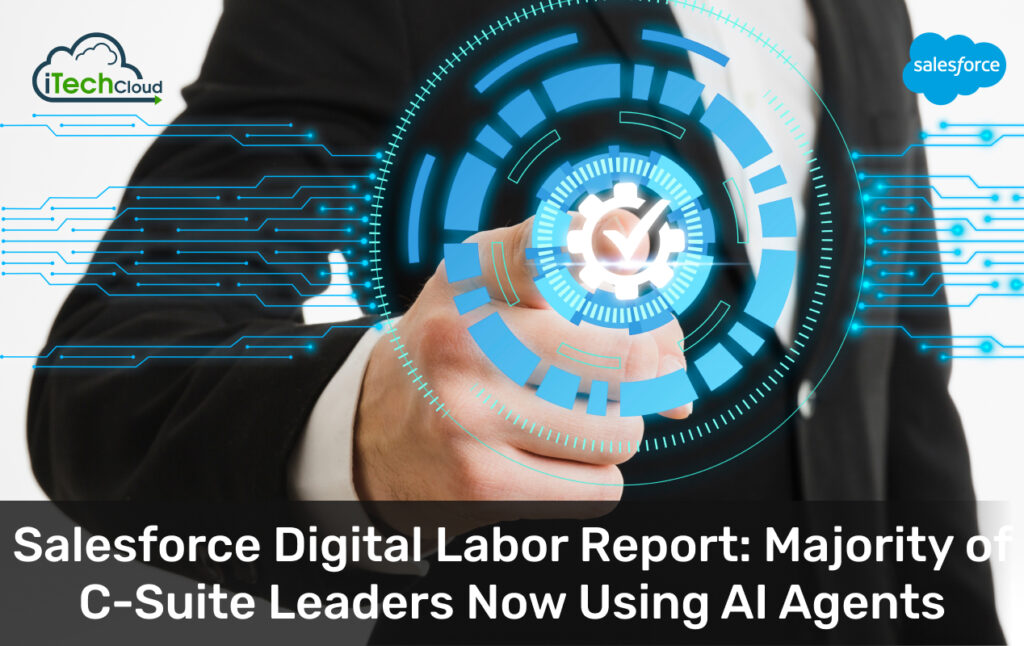Salesforce Digital Labor Report: Majority of C-Suite Leaders Now Using AI Agents

Introduction
The business landscape is undergoing a seismic shift with the rapid adoption of artificial intelligence (AI) in the workplace. According to Salesforce latest Digital Labor Report, a majority of C-suite executives are now leveraging AI agents to streamline operations, enhance decision-making, and drive productivity. This report highlights how AI is reshaping leadership roles, automating routine tasks, and enabling executives to focus on strategic initiatives.
We will explore the key findings of the Salesforce report, analyze the implications of AI adoption in the C-suite, and discuss how businesses can prepare for an AI-driven future.
Table of Contents
Key Findings from the Salesforce Digital Labor Report
1. Over 60% of C-Suite Executives Use AI Agents
The report reveals that more than 60% of top executives including CEOs, CFOs, and CTOs are now using AI-powered digital assistants for tasks such as:
- Data analysis & reporting
- Automated decision-making
- Customer relationship management (CRM)
- Market trend forecasting
This marks a significant shift from just a few years ago when AI was primarily used in IT and customer service departments.
2. AI Agents Improve Efficiency and Reduce Workload
C-suite leaders report that AI agents help them:
- Save 10-15 hours per week by automating repetitive tasks.
- Make faster, data-driven decisions with real-time insights.
- Collaboration across teams by summarizing meetings and tracking action items.
3. AI Adoption Varies by Industry
While tech and finance sectors lead in AI adoption, industries like healthcare, manufacturing, and retail are rapidly catching up. For example:
- Healthcare executives use AI for predictive diagnostics and operational efficiency.
- Retail leaders leverage AI for demand forecasting and personalized marketing.
4. Concerns About AI Ethics and Job Displacement Persist
Despite the benefits, the report highlights lingering concerns:
- Data privacy & security risks
- Potential job displacement for mid-level managers
- AI bias and ethical decision-making
Executives acknowledge the need for strong governance frameworks to ensure responsible AI use.
How AI Agents Are Transforming C-Suite Roles
1. CEOs: Strategic Decision-Making Powered by AI
CEOs are using AI for:
- Competitive intelligence (tracking market trends in real time).
- Scenario planning (simulating business outcomes based on different strategies).
- Stakeholder communication (AI-generated reports and presentations).
Example: AI-powered dashboards provide CEOs with instant insights into company performance, reducing reliance on manual reports.
2. CFOs: AI-Driven Financial Forecasting
AI helps CFOs:
- Automate financial reporting (reducing errors and saving time).
- Detect fraud through anomaly detection algorithms.
- Optimize budgets with predictive analytics.
Example: AI tools analyze spending patterns and recommend cost-saving measures.
3. CMOs: Hyper-Personalized Customer Engagement
AI enables CMOs to:
- Predict customer behavior using machine learning.
- Automate ad targeting for higher ROI.
- Generate real-time campaign analytics.
Example: AI-driven CRM systems (like Salesforce Einstein) personalize marketing at scale.
4. CIOs & CTOs: Scaling AI Infrastructure
CIOs and CTOs are responsible for:
- Integrating AI into legacy systems.
- Ensuring cybersecurity for AI tools.
- Managing AI ethics and compliance.
Example: AI-powered cybersecurity tools detect threats faster than human analysts.
Challenges and Risks of AI in the C-Suite
1. Data Privacy and Security Concerns
- AI systems require vast amounts of data, raising GDPR and compliance risks.
- Executives must ensure secure AI deployments to prevent breaches.
2. Job Displacement and Workforce Impact
- While AI improves efficiency, it may reduce demand for middle-management roles.
- Companies must reskill employees to work alongside AI.
3. AI Bias and Ethical Dilemmas
- AI models can reinforce biases if trained on flawed data.
- Leaders must implement bias detection tools and ethical guidelines.
4. Over-Reliance on AI Could Reduce Human Judgment
- AI should augment, not replace, human decision-making.
- Executives must balance AI insights with intuition and experience.
The Future of AI in Executive Leadership
1. AI Will Become a Standard C-Suite Tool
- By 2025, 90% of Fortune 500 companies will use AI agents for executive decision-making.
- AI will be embedded in ERP, CRM, and business intelligence platforms.
2. Human-AI Collaboration Will Be Essential
- The most successful leaders will combine AI efficiency with human creativity.
- Soft skills like emotional intelligence and strategic thinking will remain irreplaceable.
3. Regulatory Frameworks Will Evolve
- Governments will introduce AI ethics laws (similar to GDPR).
- Companies must stay ahead of compliance requirements.
4. AI Will Drive Hyper-Personalized Leadership
- AI will enable customized leadership coaching for executives.
- Predictive analytics will help leaders anticipate market shifts before they happen.
How Businesses Can Prepare for an AI-Driven C-Suite
1. Invest in AI Training for Executives
- Leaders must understand how AI works to use it effectively.
- Workshops on AI ethics, data literacy, and automation are crucial.
2. Choose the Right AI Tools
- Salesforce Einstein, Microsoft Copilot, and IBM Watson are leading enterprise AI solutions.
- Evaluate AI tools based on scalability, security, and integration capabilities.
3. Develop an AI Governance Strategy
- Establish AI ethics committees to oversee deployments.
- Ensure transparency in AI decision-making processes.
4. Foster a Culture of AI Adoption
- Encourage experimentation with AI across all levels.
- Highlight success stories to drive organizational buy-in.
My Takeaway:
The Salesforce Digital Labor Report highlights a significant shift in enterprise operations, with a majority of C-suite leaders now integrating AI agents into their workflows. This marks a pivotal moment in digital transformation, emphasizing the strategic role of AI in boosting productivity, decision-making, and innovation. As digital labor becomes mainstream, organizations embracing AI agents stand to gain a competitive edge, improved efficiency, and better customer outcomes. The future of work is clearly being shaped by intelligent, collaborative AI-powered systems.

